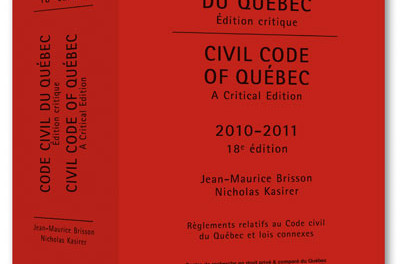Quebec’s Not-So-Little Red Book & Other Quebec Curios
The fourth part in a legal history reaching astronomic proportions
The implementation of the Civil Code of Quebec was not momentous when it came into force New Year’s Day of 1994. It had been passed as a law in December 1991. And yet at the same time, it was a momentous occasion. Maybe there wasn’t an after party like the one after the Academy Awards (although who knows?), but while it didn’t turn Quebec law onto its head, it certainly changed certain domains of Quebec civil law.
Talks for a new Civil Code of Quebec began in the mid-1950s, intended as a huge overhaul of Quebec civil law. The office responsible for the revision of the Civil Code was headed successively by Thibaudeau Rinfret, André Nadeau, and Paul-André Crépeau throughout its establishment in 1955, and produced a draft of a proposed civil code to the National Assembly in 1977. This proposed civil code, after researching and comparing all of the civil codes of the world, still had to be worked on. The proposed code was adopted as an “avant projet de loi” in 1988, then as a “projet de loi” in 1990.
Finally, under the sixty-fourth chapter of the annual laws of 1991, the legislator passed the new Quebec Civil Code into law. It is interesting to note that through this revision process, Quebec underwent ten governments, from Duplessis to Bourassa. Comprising of 525 pages, minus the table of contents, the Civil Code of Quebec formally replaced the old civil code, the Lower Canada Code, although most people had stopped calling it the Lower Canada Code, since, well, Quebec happened. This is why in some legal literature there will be mentions of the “New” Civil Code of Quebec, a strange term that continues on today with some doctrinal writers despite the “new” code being instated for the past 21 years.
Among some of the things that the new Civil Code changed from its predecessor was adding that good faith must conduct all legal transactions (a given, but still—see article 1375), and damages claims, removing, for instance, the list of people who would be able to claim damages due to the death of a person (article 1457, formerly article 1056 in the Lower Canada Code). Perhaps the most important sections changed were in family law, which instated equality, mostly economic, between married partners; coincidentally, this section was enacted before the rest of the Code. Other sections, such as those in the Obligations (Contracts) category were changed very little. Updated annually, the Civil Code of Quebec is the reference for all people involved in the Quebec legal profession. Harmonisation of the Civil Code with Canadian federal law is still in the works, and the Canadian government released a handful of acts to that purpose.
As for the future, who knows? Does the future exist at all? Changes to the Civil Code, of course, continue and will continue to happen, as law usually moves with the times, sometimes later than other domains, but as much as lawyers might like to think they can predict the future, as a society, we cannot predict changes might happen. In terms of newness, a new Code of Civil Procedure, which governs judicial proceedings, is coming in the autumn of this year.
To painfully misquote Sellars and Yeatman, all legal history, all the legal history that matters, of course, has been covered. This history is thus in full and final settlement.
Got a legal history question for T.A. Wellington? Send it here at [email protected]






